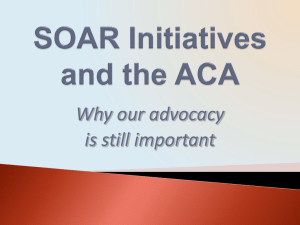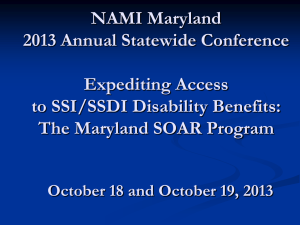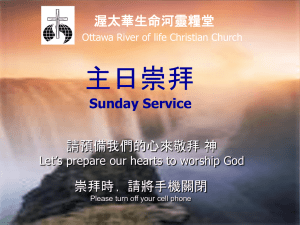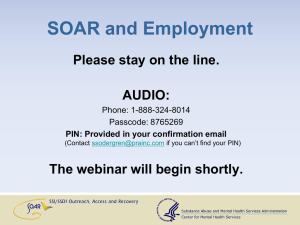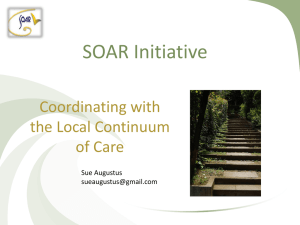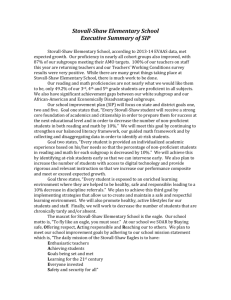Funding and Sustainability
advertisement
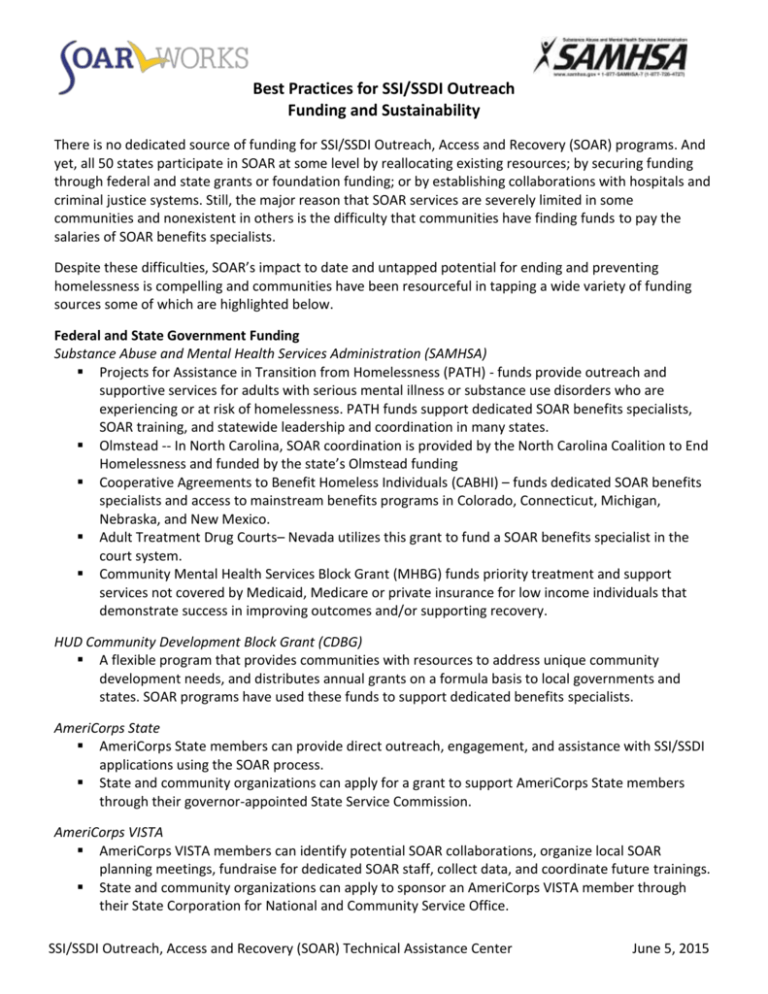
Best Practices for SSI/SSDI Outreach Funding and Sustainability There is no dedicated source of funding for SSI/SSDI Outreach, Access and Recovery (SOAR) programs. And yet, all 50 states participate in SOAR at some level by reallocating existing resources; by securing funding through federal and state grants or foundation funding; or by establishing collaborations with hospitals and criminal justice systems. Still, the major reason that SOAR services are severely limited in some communities and nonexistent in others is the difficulty that communities have finding funds to pay the salaries of SOAR benefits specialists. Despite these difficulties, SOAR’s impact to date and untapped potential for ending and preventing homelessness is compelling and communities have been resourceful in tapping a wide variety of funding sources some of which are highlighted below. Federal and State Government Funding Substance Abuse and Mental Health Services Administration (SAMHSA) Projects for Assistance in Transition from Homelessness (PATH) - funds provide outreach and supportive services for adults with serious mental illness or substance use disorders who are experiencing or at risk of homelessness. PATH funds support dedicated SOAR benefits specialists, SOAR training, and statewide leadership and coordination in many states. Olmstead -- In North Carolina, SOAR coordination is provided by the North Carolina Coalition to End Homelessness and funded by the state’s Olmstead funding Cooperative Agreements to Benefit Homeless Individuals (CABHI) – funds dedicated SOAR benefits specialists and access to mainstream benefits programs in Colorado, Connecticut, Michigan, Nebraska, and New Mexico. Adult Treatment Drug Courts– Nevada utilizes this grant to fund a SOAR benefits specialist in the court system. Community Mental Health Services Block Grant (MHBG) funds priority treatment and support services not covered by Medicaid, Medicare or private insurance for low income individuals that demonstrate success in improving outcomes and/or supporting recovery. HUD Community Development Block Grant (CDBG) A flexible program that provides communities with resources to address unique community development needs, and distributes annual grants on a formula basis to local governments and states. SOAR programs have used these funds to support dedicated benefits specialists. AmeriCorps State AmeriCorps State members can provide direct outreach, engagement, and assistance with SSI/SSDI applications using the SOAR process. State and community organizations can apply for a grant to support AmeriCorps State members through their governor-appointed State Service Commission. AmeriCorps VISTA AmeriCorps VISTA members can identify potential SOAR collaborations, organize local SOAR planning meetings, fundraise for dedicated SOAR staff, collect data, and coordinate future trainings. State and community organizations can apply to sponsor an AmeriCorps VISTA member through their State Corporation for National and Community Service Office. SSI/SSDI Outreach, Access and Recovery (SOAR) Technical Assistance Center June 5, 2015 State or County General Assistance (GA) and Temporary Assistance for Needy Families (TANF) Incentives For individuals with severe disabilities who cannot work, transitioning from GA or TANF to SSI/SSDI provides them with greater benefits and saves state funds when individuals transition to federal benefits. Programs in Minnesota, Pennsylvania, Vermont and Utah have documented savings to state programs and leveraged funding for SOAR programs. GA funds offer time-limited cash benefits to adults without dependents who have limited or no income. These benefits are not available in every state. Through an Interim Assistance Reimbursement (IAR) agreement, SSA can reimburse state or local public assistance funds when individuals begin receiving SSI/SSDI. TANF is a block grant from the Department of Health and Human Services for states to provide timelimited assistance to families with dependent children to help them become self-sufficient through employment. For parents who cannot meet the TANF work requirements, assessment of eligibility for SSI/SSDI may better meet their needs and save state funds for others in need. State or Local Plans to End Homelessness have funded SOAR leadership, coordination, and dedicated benefits specialists. In Nashville, Tennessee, the Mayor’s office funds three dedicated benefits specialists through the city’s 10-year Plan to End Homelessness. Foundation and Other Private Funding – National and local companies and foundations fund SOAR coordination, training, and dedicated SOAR benefits specialists. United Way: funds coordination of SOAR in Trenton, New Jersey; and staffing of SOAR programs in other localities Pharmaceutical and insurance companies: GlaxoSmithKline, Blue Cross Blue Shield, and Kaiser Permanente funded SOAR programs in North Carolina and Oregon SOAR programs in Colorado are funded by: The Colorado Health Foundation, The Denver Foundation, Caring for Colorado Hospital Collaborations – Hospitals can benefit from SOAR collaborations by recouping payments for previously uncompensated care when individuals approved for SSI obtain Medicaid. SOAR providers may receive funding from hospitals for dedicated SOAR benefits specialists to help individuals access SSI/SSDI and health insurance. In 2013, States reported an average $7,417 reimbursed from Medicaid per SOAR approval In Atlanta, Georgia, First Step collaborated with Grady Memorial Hospital to help get individuals on SSI/SSDI and Medicaid/Medicare. First Step shared a percentage of the funds that Grady was able to recover from Medicaid for previously uncompensated care. Criminal Justice System Collaborations – SOAR programs collaborate with jails and prisons through inreach initiatives, re-entry planning, and training corrections staff to complete SSI/SSDI applications. These efforts reduce recidivism and prevent incarceration through jail diversion, which in turn saves money for states and communities. The Miami-Dade Jail Diversion Program helps individuals apply for SSI/SSDI using SOAR while they are incarcerated. Documenting reductions in recidivism, they estimated a cost-savings to the state of $7 million in 2009. These results helped leverage on-going funding for their SOAR program. U.S. Department of Veterans Affairs (VA) – The Supportive Services for Veteran Families (SSVF) grant promotes housing stability for low-income Veterans. Funds may be used to increase access to SSI/SSDI and to support dedicated SOAR benefits specialists. SSI/SSDI Outreach, Access and Recovery (SOAR) Technical Assistance Center June 5, 2015

